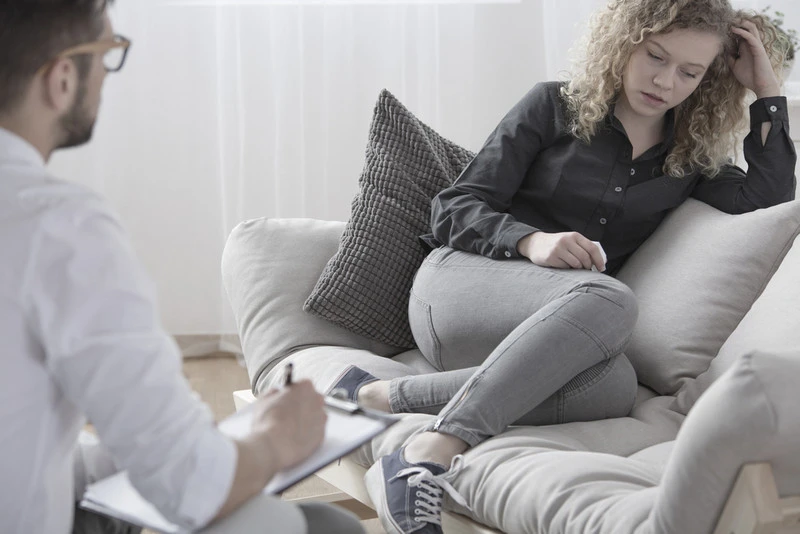Psychiatry for Depression
Depression is a mood disorder that can affect people of any age, and it can be caused by a variety of factors — it is a mental disorder that affects the way a person feels, thinks, and behaves. According to the World Health Organization, more than 300 million people are living with depression globally. Psychotherapy is an effective treatment for people with mild to moderate depression. It can also be used to provide additional support for people who are taking antidepressant medication.
A therapist will help the person identify and change unhelpful thinking patterns, which can contribute to their depression. They may also use cognitive behavioral therapy -CBT – techniques, such as helping the person to understand how their thoughts and feelings affect their behavior.

Who and how we help
Depression psychiatry for adults
Depression psychotherapy is a type of treatment that is used for people who have this issue. The goal of this type of therapy is to help the person overcome their depression and live a better life. This therapy can be done either individually or in groups with other people who have depression. A psychiatrist will first do an assessment with the patient before deciding on treatment options that are best for them.
Depression psychiatric services for adolescents
Depression psychotherapy is an effective treatment for adolescents with depression. It helps them to learn coping skills and improve their self-esteem. Doctors may prescribe antidepressants to treat adolescent depression, but these drugs are not always helpful because they may cause side effects such as weight gain or loss, nausea, headaches, insomnia, and sexual dysfunction. Depression in children and adolescents should be taken seriously because it can lead to suicide risk or substance abuse later on in life. The earlier it is detected the better the chances of recovery are.
Depression treatment steps
Depression is a mood disorder that affects one’s ability to function in daily life. There are many factors that contribute to depression, such as genetics, life events, and other mental health conditions. There are many treatments for depression available now. The most common treatments include psychotherapy, medication and lifestyle changes. The most important step in the process is to seek professional help and treatment as soon as possible.

The benefits of psychiatry for depression
There are a number of benefits of psychotherapy for depression. It helps people to understand the root cause and triggers of their mental illness. Psychotherapy also helps in boosting self-esteem, self-worth and resilience.
By combining the 3 basic approaches to treating depression – behavioral therapy, interpersonal therapy, and psychodynamic therapy – The Good Health Team can treat the disorder not only more efficiently, with better results, but faster. A blended approach, overseen by experienced professionals is the most effective treatment. It is a solution oriented methodology that uses all resources available for faster progress.
FAQs
How effective is psychotherapy for depression?
Depression is a mental disorder with many symptoms that are not easy to manage. It affects the way people think, feel, and act. It is a persistent feeling of sadness and loss of interest in activities that make them happy. The good news is that there are different types of psychotherapy for depression. They have been shown to be effective in treating this mental disorder. It is important to remember that psychotherapy has been proven to be an effective treatment for depression but it may not work for everyone who suffers from this condition.
Do I need a psychotherapist or psychiatrist for depression?
The answer to this question is not straightforward. There are many factors that determine whether you need to see a therapist or psychiatrist. The severity of your depression, the level of your suicidal thoughts and other mental health conditions, and the availability of therapists in your area are some of the things that you should consider when deciding on whether or not you need to see a therapist or psychiatrist. It is important to note that if you have had a recent traumatic event in your life it is recommended that you seek therapy for at least six months after the event has passed in order to bypass feelings of depression during this phase of your life.
How is depression diagnosed?
Depression is a mood disorder that affects the way you feel, think and act. It can be difficult to diagnose because it’s often accompanied by other mental health issues, like anxiety or substance abuse. The two most common ways to diagnose depression are through a physical exam and an interview with a doctor. The doctor will ask you questions about your symptoms and look for any physical causes of the depression-like thyroid problems or chronic pain. The doctor may also ask about your family history of depression, your personal history of depression, and any stressful events in your life that may have caused it.
What are the psychological factors of depression?
There are many factors both physical and emotional related to depression.
For example:
- The role of serotonin in depression
- The role of dopamine
- The role of oxytocin
- The role of inflammation in depression
- The role of genetics in depression
Also, traumatic events may lead to depression. The truth is that, as of right now, it is a complex disease with many possible risk factors and no single cause.
How to choose a depression psychiatrist?
In order to choose a depression psychiatrist, you need to take into account the following:
- The psychiatrist’s experience and expertise in the field
- The psychiatrist’s location and availability
- The psychiatrist’s fees and insurance coverage
- The psychiatrist’s education and credentials
A qualified psychiatrist will have either a Doctorate of Medicine – MD – or Doctor of Psychology – PsyD.
How long does it usually take to achieve results from depression psychotherapy?
Depression therapy is a treatment that includes the use of psychotherapy, antidepressant medication and other tools to help with depression. There are many different types of depression psychotherapy. Some therapies may not work for you and your therapist will explore different options with you. The time it takes to achieve results depends on the type of therapy, severity of depression and how well you follow treatment recommendations.
Don't hesitate to contact us
Have any questions?
Please complete the form below and we will get right back to you.